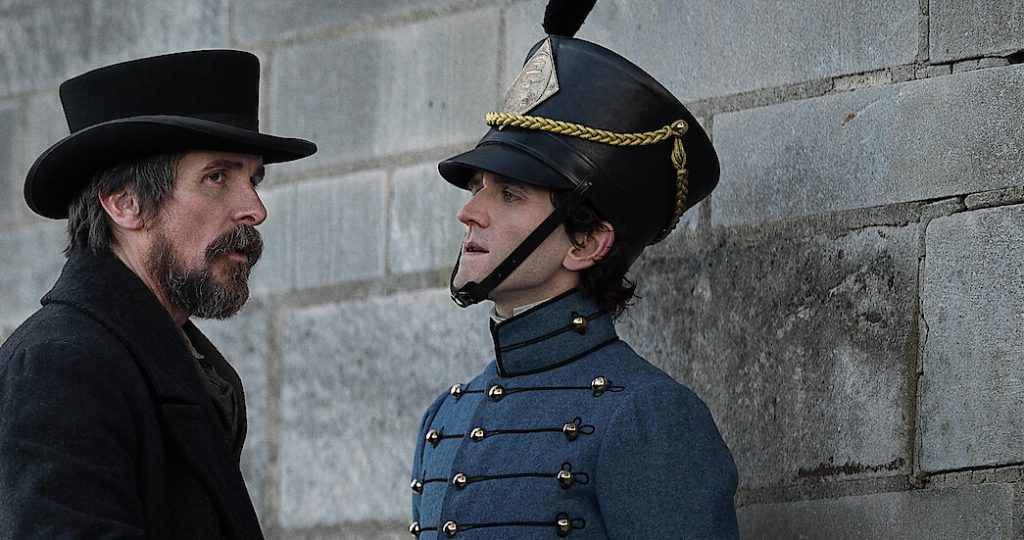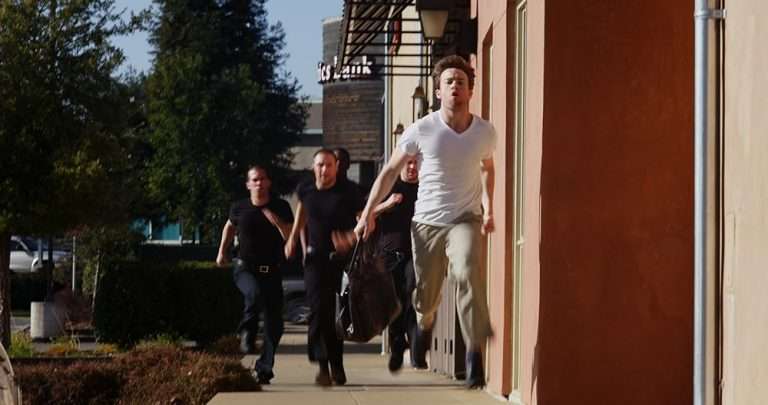The Pale Blue Eye Netflix Review: The Pale Blue Eye on Netflix is a very unconventional whodunnit. The larger differentiator, of course, is the setting. It cannot be quite called a period drama, nor can it be written off as one. But boxing it in a single box might be unfair to Scott Cooper, who tries to expand his narrative into different human emotions. However, that very decision makes the experience of watching The Pale Blue Eye somewhat frustrating.
Christian Bale, a two-time collaborator of Cooper’s before this, once again partners up as the film’s main man, Augustus Landor. The US military tasks him to solve the mysterious murder of Private Henry Fry. The exact year the story takes place is 1830, and we see the highlands turn into an unyielding, indifferent snow land to no end. A very impressive Harry Melling plays Edgar Allen Poe, whose body of work only seems to get better with time. Although there are no direct connotations of him playing the author, it happens for some weird reason, perhaps as a literary obligation, as the film is based on Louis Bayard’s 2003 novel of the same name.
These two work together to investigate Fry’s death. Matters become complicated when another cadet is murdered in the same vein, his body is mutilated, and another cadet runs off. Without giving the tangible impression of chaos, Cooper’s world descends into a primal tug of war between the central cavalry. Thematically, the strongest emotion is vengeance, whose revelation comes late in the film. Other allied ideas that the characters often find themselves jostling with our regret, fear, and melancholy. Despite this well-oiled marriage of emotions, the film still proves uncompelling.
One of the main criticisms that should go to Cooper’s effort is disorganization. There is a lack of linkage in the various phases of the Pale Blue Eye that leave the viewer scratching their head. Making sense of important plot points becomes difficult as Cooper is unable to make his storytelling cohesive. A lot of what happens manifests behind the scenes. We do not actually see any of it happening, and in hindsight, it is a failed creative choice. What it does is keep us in the dark for too long. It makes the plausibility of those events happening too bleak and improbable.
Most of these threads in the story come across as very undercooked. The writing on these parts seems to be half-hearted, and hence, the execution feels unconvincing. For instance, Robert Duvall makes a valiant cameo, but his character is not tied into the events properly. That ends up making his presence in vain. And he is just one of the many characters who become ineffective. Another choice that makes it difficult for The Pale Blue Eye to warm up to the viewer is lighting. Almost half the film takes place in dud darkness.
Following things becomes a very challenging task. And since there are few twists and turns, it leaves us uninterested. Masanobu Takanayagi’s work in the light presents some haunting visuals for you to savor. They do tend to add an atmospheric chill that the film desperately needs. Bale’s Augustus Landor is a bright spot. His arch keeps us invested with his character, and some of the moments when he grieves for his daughter and realizes the reality of his life on those long nights are truly touching.
He sports a similar appearance to his character from Hostiles (also directed by Cooper), but the two are quite different. Melling outshines his compatriot on some occasions, especially those when he mesmerizes with Poe’s poetry. When some of those verses overlap with story construction, Cooper’s project endures in memory. But those moments are limited, and perhaps we could have fallen into a habit to like those patterns.
The Pale Blue Eye pales in comparison to some of the other contemporary works in the genre. On its own, it is a mostly watchable film but barely. Although the intention was to position it as a slow burn that melts at its own pace, it never really materializes. Manifesting the will to sit through the long runtime is hard, and I am still on the fence about recommending it as your weekend watch. Leaning towards a soft pass.



![The French Dispatch [2021] ‘BFI’ Review: A Quirky cast, stunning shots, but little else](https://79468c92.delivery.rocketcdn.me/wp-content/uploads/2021/10/The-French-Dispatch-768x562.jpg)
![Turning Red [2022] Review: Pixar’s Hopeful Take on Constant Changes of Life is Positively Giddy](https://79468c92.delivery.rocketcdn.me/wp-content/uploads/2022/03/Turning-Red-2-768x432.jpg)
![Paka (River of Blood) [2021]: ‘TIFF’ Review – A Tale of Cyclic Revenge that Reflects Potential](https://79468c92.delivery.rocketcdn.me/wp-content/uploads/2021/09/Paka-River-of-Blood-768x427.jpg)
![Retour [2017] Short Documentary On MUBI: A Chris Marker Styled Time Travel](https://79468c92.delivery.rocketcdn.me/wp-content/uploads/2020/10/Retour-Return-highonfilms-768x432.jpg)

![A Gaza Weekend [2022] ‘TIFF’ review: A Massively Entertaining Tale of a Couple Helplessly Searching for Safety](https://79468c92.delivery.rocketcdn.me/wp-content/uploads/2022/09/Gaza-Weekend-2022-768x384.jpg)